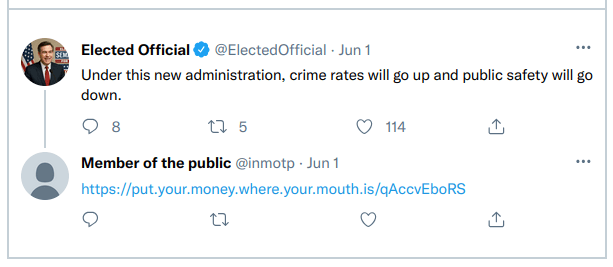A website to create bets with strangers
By bob @ 2025-07-22T10:25 (+5)
Consider the following scenarios:
- A pundit makes a prediction you know is wrong. You'd like publicly challenge the pundit by offering a bet, but you don't trust them to pay up when they're wrong. The pundit doesn't know you, and probably doesn't trust you either.
- You're an academic who found something surprising that could save lives. The scientific community dismisses your results. You're so sure of your experiment's validity you'd bet that replication attempts will go the same way, but you don't know any of your disparagers personally. To reignite the debate on your results, you'd like to submit an open bet offer to your community without having to vet potential takers.
- You're in an anonymous online argument about a niche prediction. You'd like to set up a bet with your opponent without revealing your identity.
Currently, there's no easy way to set up bets with strangers. The resolution of casual one-on-one bets is predicated on a system of honor. The winner has to trust the loser to pay up. However, many important societal disagreements happen outside one's personal circle, where this trust doesn't exist.
Enter Mouth.is
Mouth.is is a Web3 application that allows anyone to create a bet on virtually anything. It offers the following guarantees:
- For the duration of the bet, the stakes are locked in. It’s impossible for either party to renege on a bet.
- The arbiters appointed by the bettors are the only ones who can transfer the stakes and they can only transfer the stakes to the bettors.
- If the arbiters don’t transfer the stakes to the bettors within 31 days after the bet’s deadline, both bettors can withdraw their own stakes.
Offering a bet is as simple as filling in a form, putting up your stakes and sending a link. An example:
The attention-grabbing version of the same link:
https://put.your.money.where.your.mouth.is/BIiqZ-fmFL
The home page explains the process more thoroughly.
Arbiters
For the first few years, we’ll allow bettors to appoint us as arbiters for a flat $5 fee, deducted from the winnings. Beware that we always annul bets on sports, horse races, private events, stock movements, terrorism and individual deaths, as well as bets with a deadline beyond 2028. We usually interpret ambiguously worded bets in the taker’s favor whenever the ambiguity becomes relevant.
The goal is to have multiple verified arbiters by the end of 2028.
Fig 1: Bet offers show you're not disagreeing for the sake of disagreeing, even if the person you're interacting with is unlikely to respond
Rasool @ 2025-08-08T08:09 (+2)
One website, which doesn't quite match all your criteria, is https://longbets.org/bets/, which has bets from people like Warren Buffet, Scott Alexander, Ray Kurzweil, and Eric Schmidt
calebp @ 2025-07-22T10:49 (+2)
This is really cool. I suspect that you'd make it a lot easier to find users if you didn't need either side of the bet to be at all familiar with crypto. How hard would it be to accept venmo/paypal/bank transfers?
bob @ 2025-07-22T11:34 (+1)
I agree that crypto is not the most user-friendly option, but more traditional options would almost certainly increase the regulatory and administrative burden on arbiters.
On the regulatory side: the use of crypto allows arbiters to never have full custody over funds. The law obviously hasn't caught up with crypto yet, but we don't think anyone will argue arbiters passively appointed by bettors are hosting games of chance. If arbiters actually agree beforehand to receive funds from both parties, and they even have the option to run away with the funds, we expect regulators to give them a lot more scrutiny (and rightfully so).
On the administrative side: arbiters have no risk of assets being frozen because their payment processor mistakes them for an online casino, there's no risk of arbiters' personal finances and stakes commingling, etc.
We tried to keep the crypto aspect as simple as possible. We use a stablecoin (1 xDAI = 1 USD) that can also be used for the (negligible) transaction fees, and there is no need to set up allowances or other weird stuff. Still, we won't deny it's a hurdle.
